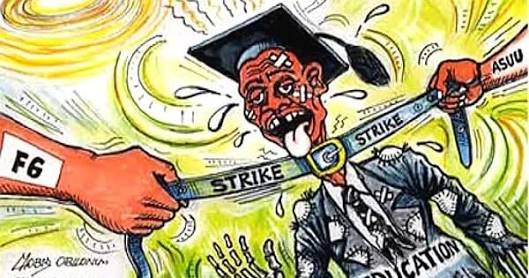The Insight
By Lateef Adewole
In the next one week, it will be exactly six months since the ongoing strike by the university lecturers was declared by the Academic Staff Union of Universities (ASUU). This affected all students in public universities of federal and states. In the last 23 years, this is the 16th strike called by ASUU. And in all, they have gone on strike for about 53 months. This is equivalent to 4 years and 5 months, a period enough to earn a degree. And still counting. These strikes are always based on disagreements between ASUU and the governments on many issues, particularly of funding of the universities, whether for personnel or infrastructures. This is so disheartening.
The implications of this are dire, with negative consequences. First, students are at home, idle and prone to vices. Devil finds work for idle hands. The abundance of time in their hands have led many to get into crimes. They become vulnerable to be lured by criminals like cultists, armed robbers, kidnappers, etc. Girls go into prostitution. They lose academic years. The backlog of students seeking admissions continues to increase. Many schools have not admitted fresh students for two sessions, despite the already inadequate admission slots.
Imagine a combined admission slots available in all universities that is less than 600,000 and about 2 million students take JAMB every year, majority of them seeking admissions into the universities. All these are disincentive to university education. When students stay for so long at home, their capacity to study is affected. This will translate to low quality of graduates from such system. By the time the strike is called off, many students might not be able to resume for various reasons. Some girls could have fallen pregnant. Loss of interest by boys or other factors. When many youths are told the value of education, many of them would ask: “who school epp?” Can anyone blame them?
Like I once wrote, when young people consider making money as the end in itself and only reason for going through this rigour of academics, why won’t they look for shortcuts? What do we also glamorise now in our society? How much value do we attach to education? One can say it is the reason why such strike is so frequent and take many months to resolve. A society that values the education of her citizens, especially the youths, will not allow such important sector to suffer like this.
But, can we blame most people who are in authority and who are responsible for handling this, when many of them do not have their children in these schools? Supposing the children of the president, vice president, senate president and his vice, speaker of the house of representatives and his deputy, ministers, governors and their deputies, commissioners, elected lawmakers and other important political office holders, are at home with them due to the strike, surely, a solution would have been found since.
The issue of ASUU strikes and our deteriorating education is one I often avoid as much as possible. This is because, many of my friends who belong to the sector often queried why I also did not get involved if it is that lucrative. For those who know me personally or who have read about my academic background, most people expected me to be in the academics. It is a profession I hold in high esteem. Many of my school contemporaries are professors and doctors, lecturing in different universities and polytechnics in Nigeria, as well as around the world. So, I was always guilt-tripped for “abandoning” academics for greener pasture, since I worked in oil and gas sector.
I have many scathing opinions about what our schools have become, and the blames can go round. The government, the university managements, the ASUU, students and their parents. Striking a balance as per what is and what should be, is a dicey situation. The truth of the matter is that education is not cheap. Quality education is expensive. As the saying goes: “if education is expensive, try ignorance”. This is easier said when considered in isolation of other socioeconomic crisis citizens face.
To be frank, the public schools (higher education) in Nigeria is possibly one of the cheapest in the world. Anyone who has children schooling outside the country could tell better. Even in many “mushroom” institutions in neighbouring African countries, some which are not better than some secondary schools in Nigeria, Nigerian parents still send their children there and paid millions of naira that they won’t pay in Nigeria. Going to the Western world is a different ball game.
In those countries, going to universities is not expected to be compulsory for everyone. Interested students hugely pay for it directly or indirectly by the means provided by government in the form of student loans, which they have to pay back after graduation once they start working. There are other aids in the form of grants and scholarships that are also awarded to students based on different criteria. So, it is not like ours where everyone just wants to go to the university because it is “almost free”. But, if it is not “almost free”, do governments at all levels have programmes in place to support the prospective university students like abroad? No.
Assuming students can get loans to finance their university education where proportionate tuition is charged, what assurance do they have after graduation to get jobs in order to pay back the loans? If the students have to pay commensurate fees for their university education, can their parents afford it? In a country whose citizens are enmeshed in grinding poverty, that ordinary feeding is becoming a luxury, where will they get such money to send their wards to the university? I know because, had such was the situation at the time I was in the university, I could have dropped out because my parents would not be able to afford it. What could have been my fate today?
So, a point has to be reached where we all, as a people, must decide on what we want. Do we want watery free education or reasonably priced quality education? The first thing is sincerity on the part of all. But can we ever be sincere as a people, especially those among us occupying political offices? When ASUU goes on strikes for many important reasons that boiled down to funding, and the government complains of paucity of fund, yet, ASUU sees how the available meagre resources are being squandered on inanitities. No one will take government serious with the level of profligacy we see them displayed daily.
Can the remuneration packages of political office holders be compared to those in academics? Can their welfare packages be compared? No. They live large at the expense of not only ASUU and the university education, but of all of us who are not in government. How can such people then claim there is no money? Preposterous!
Agreements made with ASUU since 2009 till date have been observed more in breach by successive administrations. It depicts their disinterest. What percentage of annual budgets is allocated to education sector? Meagre. No federal government has done 15% in Nigeria’s history. Lecturers use their personal meagre salaries to publish their papers, which are very expensive. Why won’t they avoid doing so? How much research grants are approved for them?
But, has the university lecturers exhibited enough qualitative initiatives, research interests, create innovations and inventions that could encourage and attract fundings, not just from the government but private sector? Many people criticised ASUU as being overbearing and undeserved of all the attention based on their perceived low performances. What are the focus of our university lecturers? Are they directing their research interests in solving our immediate problems or just looking for peer-reviews for promotions?
In many countries around the globe, the quality of researchs carried out in the university environment and products coming out from there, attract hundreds of millions of dollars yearly to the schools in grants, voluntary donations and supports to the schools. What is the synergy between our academics and industry? Are the schools researching into what industry needs, and by extension, what the larger society needs? What value is attached to their works?
Mismanagement of allocations to the universities. We have been inundated by scandals about mismanagement of funds given to some schools by their managements, in some universities in the past. What positions did ASUU in such schools take? What is ASUU’s effort at ridding the universities of corruption? Are they not complicit by complacency or active participation, as the case may be?
Commercialisation of admissions. Getting into the universities is now like wanting to go to paradise. It is simply not by merit majorly again. A substantial percentage is shared among the stakeholders within and outside the universities, including ASUU members. Rather than transparently opening up the admission process and admit a large number of students on merit, the slots are “sold”. The quota system standard is; merit 45%, educational disadvantaged 20%, catchment areas 25%, and vice chancellor’s discretion 10%. An audit of the admissions in each university will shock Nigerians. It has been bastardised.
Parents now pay through their noses to get their wards into schools. The sex-for-grade and money-for-grades can no longer be denied by ASUU. Preying on youngsters for sex and money is a common place, but ASUU often looks away from it. Many of their members, who have been caught with sufficient evidences, are either in jail or on trial. Many have been sacked. It is always a difficult case to prove and win by the victims (students) because lecturers often cover up for one another in the spirit of “espirit de corp”.
Some lecturers are also of low quality themselves. What quality of students do we expect from such teachers? They have refused to develop themselves. Had there KPI (Key Performance Indicators) that are strictly followed and continous evaluations done for lecturers too, like done in private sector, and being implemented in the civil service, many would have long been sacked. We saw examples of this at lower levels where state governments decided to test the teachers. How could a teacher not be able to answer and pass the exams of classes he teaches? Yet, teachers’ union defends and fights for such. Kaduna state is still battling with this now.
As a way forward, there is need for the parties to come to the table and agree on something, at least, to call off the strike. The demands by ASUU should be looked into and whatever is immediately possible, should be implemented by government. ASUU also need not be recalcitrant in their stand. They should be malleable for progress to be made. Fighting about payment platforms (IPPIS and UTAS) looks absurd to outsiders. Ingenious ways of funding the universities need to be deviced by the university managements and their respective ASUUs. Government alone can no longer fund them effectively.
Nigerians were so impressed and delighted to the news of a huge donation by Dr. Philip Ozuah to his alma mater, the College of Medicine, University of Ibadan, few days ago. It was an initiative of the current Provost of the College, Professor Olayinka Omigbodun, who happened to be his classmate of 1985 set. She called for help to build new hostel, upgrade existing one for medical students, and other structures. In Virtual-Sod Turning ceremony for the fund raising on zoom, many old students across the world donated generously. The announcement by Dr. Ozuah, who was a keynote speaker and fundraiser-in-chief, of a donation of one million dollars shocked the participants. It was reported that the “wow” reactions ended the programme. This is one of creative ways that our universities can be assisted.
Sincerely, many old students of all these public universities, who used to be so proud of their schools, are unhappy with the state in which they are today. Rather than such an adhoc initiative of Professor Olayinka, universities should begin to evolve deliberate policies to harness the huge human capital available to them from their alumni. Many well-to-do like Dr. Ozuah, are all over the world will be willing and glad to help but no formal avenues to do so.
Many others have links and access to global agencies, organisations and individuals all over the world, who can be of help. Isn’t it “stupid” (pardon my language) that some Nigerians, who schooled in Nigeria and enjoyed the free education of the country, made and still making money in Nigeria, will then go to make donations to universities and schools in some advanced countries like USA, UK and Canada, while their own schools back home are in big mess? Ludicrous.
Throwing money at problems alone will not solve them. There is need for overhauling of the whole system. The need to review the school curriculum to meet today’s needs and future demands cannot be overemphasised. Many things with which students are burdened during their academic years are irrelevant to their core interest / field. Rather than focus indepth on courses of interest to students’ professions, many courses that distract them are introduced and sometimes made compulsory. What a waste of time.
Not every child should or is meant to go the University. Many should deliberately go to Polytechnics, Colleges of Education, Technical and Vocational Training schools. But, are the polytechnic lecturers not going on strikes too? Governments at all levels should increase their annual budget allocations to education. It is lack of proper education that has led many youths to crimes, on which governments now spend trillions of naira to curb. This is money that could have gone into their education in the first place but now go to defence and security, wastefully. Proper oversight of these institutions should also be done to ensure effective utilisation of allocated funds. University managements should access many funds already provided in bodies like TETFUND, PTDF, and the likes. They should reach out to private organisations too.
In all, the strike is long overdue to be called off. Everyone is tired of our students being at home. These are the country’s future wasting away. It does not hold well for the country and our society.
May God continue to protect us and guide us aright.
God Bless Nigeria.
You can follow me on:
Twitter: @lateef_adewole
Facebook: Lateef Adewole
Email: lateefadewole23@gmail.com
Whatsapp: +2348179512401
Share, forward and retweet, as sharing makes love go round!



